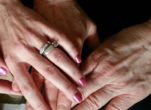
18-Year-Old Girls
I play a game now when I am left alone in a public place called “how to not get raped and murdered.” First, I check out my surroundings and find the best exit and the person that looks most dangerous. Also, the person I would never expect. I curse under my breath when I put my hand in my pocket and realize my pepper spray is in my other coat pocket. I quickly grab my water bottle because I cannot lose a second and grip the top of it so hard my knuckles turn white. If I don’t have my water bottle, then I make a point of finding my best weapon with the great Ron Swanson’s words in my head, “Literally anything is a weapon.”
I try to force my somewhat childish face to harden so maybe I will look like a threat but probably just end up looking like I am having a hard time breathing. I try and remember all the tips my dad has told me about self-defense, and the instructions from my eight-year-old sister who showed me how to break someone’s arm during winter break. I plan everything out in my head from the attack to the exit. As each person on my threat list walks past me, I revise the plan and get no relief until the friend I am waiting for comes back.
I made this game up after the anxiety of leaving for college and being on my own seeped into my mind. My anxiety grew when I read part of my future college’s student message board. The title in big bold letters read, “IS OUR COLLEGE HIDING YOUR RAPIST?” My heart dropped. My hands got sweaty. I couldn’t breathe.
I started having dreams about strangers and creepy family friends who would try and kill me. In my dreams, my dad would always be there, close enough where I could see him but too far away for him to hear me. I later realized this was a sign of leaving my safe place and everything familiar. I started taking sleeping medicine so when I woke up, my bad dreams would be nothing but a fog of nothingness. When dreams did seep through the fog of feet-smelling pills, I woke up scared and breathless. I moved my dirty-clothes basket in front of my door and slid the aluminum baby-blue bat into my bed so I could hug it tight.
Two weeks later, while drowning in this anxiety, new anxieties formed. My self-esteem dropped and I no longer felt like my soul was beautiful. I sat too long at the table, shoving food around with my fork, slowly working up the courage to tell my dad about all the things swirling around my head—my fears for the upcoming year, how I’m afraid to be a victim. I started off telling him about the student message board and the daily-summary emails I get with what people have been talking about. I hadn’t even thought about my college being dangerous. There are no fraternities or huge football teams.
After I told my dad about the “hiding the rapist” thing, there was a moment of awkward silence. I had just thrown it out there with no warning. He spoke as if he were uncomfortable, not because it was a weird topic or the word rape was uncomfortable to him, but because I am his second oldest daughter. Because to give your second oldest daughter tips on how to be the safest is a sad conversation. And that’s what he did.
He reassured me that with schools like mine, our problems might be more about miscommunication with consent, not to downplay it at all. He told me we would have a conversation about self-defense before I left and to always travel in a group and carry pepper spray and don’t get silly. This was strange dinner conversation. We didn’t talk about school stuff or politics or my siblings. We talked about how happy we were that I wasn’t going to a school with a huge football program and fraternities because the reality of being raped would be a lot higher.
This is our reality.
We live in a society where people laugh and mock rape culture. A society where rape is a forbidden word that stains people’s mouths so we never address it. Rapists and sexual predators are cool if they’re rappers or big Hollywood stars, and no one thinks twice about listening to their songs or watching their movies.
A society where boys are taught that girls dress for them. And schools teach girls from the beginning what’s appropriate for them to wear or not to wear because my shoulders, knees, and thighs can create something “I was asking for.”
Ray Bradbury says in his introduction to Fahrenheit 451, “There are three phrases that make possible the world of writing about the world of not-yet.” The phrases range from teleporting us from our present to a likely or unlikely future (“what if”), letting us adventure into the fog of tomorrow (“if only”), or the hard yet predictable bigger present day (“if this goes on”).
What if 18-year-old girls two months away from going to college didn’t have to sit at long tables meant for more than two people, playing with her noodles with a weirdly bent fork as she works up the courage to talk to her dad about the thoughts that haunt her dreams at night? What if 18-year-old year old girls didn’t have to wake up in the middle of the night from dreams that are way too real, putting the dirty hamper in front of her door and sleeping with a bat in her bed? What if 18-year-old girls heading off to college didn’t have to have awkward conversations about the fear of being raped? What if 18-year-old girls’ dads could say, “Don’t worry,” instead of, “Be careful and travel in packs.”
If only 18-year-old girls two months away from going to college could stop reading articles about victims her age. If only 18-year-old girls could stop reading trolling comments of shame. If only 18-year-old girls didn’t have to think about what clothes might set off the wrong person. If only 18-year-old girls’ biggest worry about going away to college was what to bring, and whether they would under- or over-pack.
If this goes on, 18-year-old girls, fearing things that are out of our control but might totally destroy us, could be in ruins. If this goes on, 18-year-old girls hearing victims blamed because of their clothes will have our souls devoured into black ash like forest fires—beautiful but slowly burned into nothing. If this goes on, 18-year-old girls will grow up being taught that even though we are brave and strong, we can still be overpowered and degraded.
If this goes on, women will stand up and fight…because this is our reality and because we are nasty women. And despite all these fears, I am taking the leap.











0 comments to "18-Year-Old Girls"